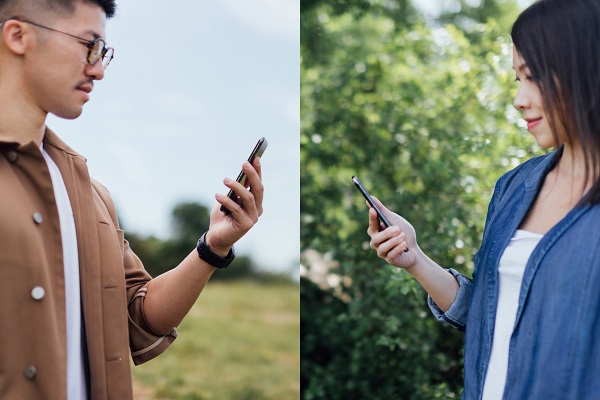
Since the first dating site launched in the 1990s, online dating has grown in popularity and become normalized around the world. Millions of people use it to find love and companionship – but as well as the rewards of finding a partner, there are also risks, including online scams and unwanted or threatening behavior. In order to have a safe, successful dating experience, it’s important to be aware of potential dangers and how to avoid them.
Dangers of online dating
The downsides of online dating go beyond being ghosted or having your heart broken – there are risks involved in meeting strangers online. Potential threats include:
Online dating scams
Dating app scams – also known as romance scams or romance fraud – take place when someone believes they have made a connection or match through an online dating site or app but the person they are talking to is, in fact, a scammer. The scammer manipulates or grooms the other person to gain their trust over time, ultimately so they can either ask them for money or obtain enough personal information about them to steal their identity. Read more about common romance scams here.
Fake dating apps and sites
Not all dating apps or sites are genuine. There has been a spate of fake dating sites and scam dating apps, so much so that in 2022, the Better Business Bureau in the US issued a warning about them. Fake dating sites can be hard to detect and people usually find them through online ads or search engine results. At first glance, they seem legitimate, with automatic sign-up via your Google or Facebook accounts, testimonials, an ‘18+ only’ disclaimer, and links to pages you would normally expect to see, such as a privacy policy and terms and conditions. However, most profiles on these counterfeit sites are fake, and replying to them usually costs you money. If you complain to the customer service team, you’ll find they are fake too.
Fake profiles or catfishing
Statistics vary, but it’s estimated that as many as one in 10 online dating profiles are fake. Motivations for creating a fake dating profile vary – some are set up to sell or market a product to others, whilst others are created for catfishing (creating a fake persona to start a relationship with someone). Others are more malicious and are designed to scam users out of money.
Harassment and unwanted messages
A Pew Research Center study in 2020 showed that many women experience some form of harassment on dating sites and apps. 57% of women online daters aged 18 to 34 said they had received sexually explicit messages or images they hadn’t asked for. In the same study, 19% of women aged between 18 and 34 reported threats of physical harm.
Stalking
The same Pew Center study also found that 37% of online daters said that other users on a dating site or app continued to send them messages even after they had indicated that they weren’t interested in communicating. Sometimes, the risk goes beyond users who won’t take no for an answer, and this can turn into real-life stalking. In some cases this could include stalkers finding out where you live or work and turning up in person to harass you.
Online dating addiction
Online dating can become an addiction for some people. If you are using online dating apps, it’s a good idea to take breaks every now and then. This will give you some perspective and allow online dating to remain fun rather than stressful.
Warning signs to look out for while using dating apps
Dating app safety is paramount. When chatting to other users, potential red flags to look out for include:
- Someone you’ve only met online asks you for financial assistance, perhaps because of a personal crisis
- They claim to be based in your country but are currently working or travelling abroad which prevents them from meeting soon
- They claim to be recently widowed with children
- They disappear from the site and then re-appear with a different name
- They only ever give vague answers in response to your questions
- They bombard you with over-the-top compliments and romantic sentiments early on in your communication
- They are keen to move you off the dating platform as soon as possible and continue the chat via another platform such as WhatsApp instead
- They request your home or work address, perhaps using the pretense of sending you gifts or flowers
- They tell inconsistent or melodramatic stories about themselves
- They use disjointed language or grammar
Many of these are established techniques used by fraudsters who want to fast-track a relationship to take advantage of genuine users. Many scammers will come on strong very quickly, hoping to flatter you into dropping your guard, or play on your sympathies.
Examples of user behavior you may want to report could include:
- Requests for financial assistance
- Requests for explicit photographs
- Messages from a minor
- Abusive or offensive messages
- Attempts to threaten or intimidate you in any way
- Fake or duplicate profiles
- Attempts to sell you products or services

Online dating safety tips
While you are not to blame if someone behaves in an aggressive or inappropriate way toward you when online dating, there are steps you can take to maximize online dating safety. Here are some useful tips to bear in mind:
Use a unique photo
For your dating profile, avoid using the same photo or photos that you have on your social media accounts. It’s easy for someone to do a reverse image on Google – and if you are using the same photos on your dating profile as Facebook and Instagram, then you can be found on social media. From there, potential scammers could start piecing together information about you. Also, do not use photos with which someone can find out where you live or work. This information can be used in social engineering schemes: for example, a stranger will say that he saw you in the office and works not far from you, although in fact this is not true and is done only to gain your trust.
Guard your personal information
As well as using unique photos on your profile, ensure you keep personal details to a minimum. This includes information like your last name, contact information, date of birth, place of work, where you went to school, social media handles and so on. This information can make it easier for hackers to guess your passwords. They can also use the information to send you phishing emails. Instead, use your first name or a nickname.
Don’t link your social media profiles
Keep your dating profile and your personal social media accounts separate. You likely have more personal information on those accounts that can be used by hackers or scammers. It’s a good idea to review the privacy settings on all your social media accounts to ensure these are set to a level you feel comfortable with.
Stay within the dating app
When chatting to a potential date or someone you’ve only just met, it’s best to keep your messages within the dating app. Scammers often want to move you off to encrypted messaging platforms like WhatsApp, where their behaviour can be less easily monitored. Staying inside the dating app gives you an extra layer of protection, since some apps do not allow people to send links within messages and most will have reporting or blocking functions. And if things don’t work out, you don’t have to worry about the other person having your number.
Limit your use of location settings
Turn off the app’s location settings or use them sparingly. It’s better to cast a wider net than to allow strangers to pinpoint the neighborhood you live or work in.
Use a trustworthy site
There are thousands of dating apps available worldwide. Not all of them are the same quality. Do your research before you choose one – read online reviews and ask your friends for recommendations. Often, the larger, more well-known sites will do a better job at protecting your private information and ensuring secure online dating. Once you have stopped using whichever dating app you decide upon, remember to delete your profile.
Don’t be afraid to report someone
The safest dating apps will encourage users to report aggressive or illegal behavior. They usually include the option to block an individual user if your interactions make you feel uneasy. If someone is harassing you or attempting to extort money from you, contact the dating site’s customer support team.
Avoid interacting with suspicious profiles
If the person you matched with has posted only limited information and only one picture, it may be a fake account. Be cautious about connecting with someone you have so little information about. Trust your instincts about whether you feel someone is genuine or not.
Video chat before you meet up in person
Once you have matched with a potential date and chatted, consider scheduling a video chat with them before meeting up in person. This can be a good way to help ensure your match is who they claim to be in their profile. If they strongly resist a video call, that could be a suspicious sign.
Tell a friend where you’re going
Before meeting your online date in real life, tell a friend who you are meeting, where you are going, and what time you plan to be home. Consider planning a ‘safe call’ – that is, asking a friend to call you during the date to check that you are okay.
Meet in a public place and arrange your own transport
For your first date, arrange to meet in a public place and provide your own transportation. Being in control of how you get to and from the date allows you to leave when you want. Have a few ride share apps downloaded on your phone so you have options if you need them. Make sure your phone is fully charged or consider bringing your charger or a portable battery with you. Avoid letting someone know exactly where you live.
Stick to what you are comfortable with
Often, dates can involve drinking. Try to keep your limits in mind and don’t feel pressured to drink just because your date is drinking. Stay aware and alert. Don’t leave your drink unattended and keep the first couple of dates short. Some people feel safer carrying a self-defense tool with them, such as pepper spray or a high-powered flashlight.
Trust your instincts
Always listen to your instincts and feel free to leave a date or stop communicating with somebody if you feel uncomfortable. Don’t worry about feeling rude—prioritize your safety. If you felt uncomfortable or unsafe during your date, then block or report your match afterwards to prevent them from interacting with your profile again.
Protect yourself and your devices
One of the best ways to stay safe online is by using a comprehensive internet security software. Security software can protect you from clicking on malicious links that a scammer may send you, while also helping you to avoid other threats like viruses, ransomware, and phishing attacks in general. It can look out for your personal information as well, by protecting your privacy and monitoring your email, bank accounts, credit cards, and other information that a scammer or identity thief may exploit.
Recommended products:
- Kaspersky Anti-Virus
- Kaspersky Internet Security
- Kaspersky Password Manager
- Kaspersky Secure Connection
Further reading:




